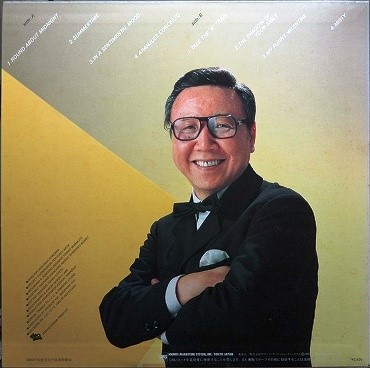Miyama-sensei, the New Herd, and their auspicious start in 1958 have grown from strength to strength over the 1960s with concerts and summer residences throughout Japan. They expanded their repertoire to include Latin Jazz and, most importantly, the Twist! 1963 saw Miyama-sensei support Anita O’Day’s Japanese Tour. This was their first collaboration with a major west artist. They played to Buddy Bregman orchestrations, and featured highly respected Japanese players like Sawada Shingo and Saijo Konosuke. I wish I could have been there. Speaking of orchestrators, Miyama-sensei by now was working with the cream of the Japanese crop: in addition to Maeda Norio, there was work from SPACE BATTLESHIP YAMATO Composer Miyagawa Hiroshi, Yashiro Kazuo, the legendary Miho Keitaro (leader of the Japanese Jazz All-Stars) and, as an interesting side note, working with Movie Composer Uno Seiichiro on the groundbreaking stop-motion children’s TV show HYOKKORI HYOUTANJIMA (THE MADCAP ISLAND), produced by NHK (Japan’s BBC/RAI/PBS…), including the title song (c’mon Japan, sing it with me: Hyokkori Hyoutan-jima, Hyokkori Hyoutan-I–JI—-MA!). Sumimasen…back at the orchestrators. Miyama-sensei called on his musicians to orchestrate the band. Altoman Takami Hiroshi (RIP), and the amazing Guitarist Yamaki Kozaburo were both instrumental in the New Herd’s early development. He was also composing original music for them, a title he holds today. 1968 saw a long-standing collaboration between Satoh Masahiko and the New Herd. This led to Altoman Takami Hiroshi (RIP) and the incredible Guitarist Yamaki Kozaburo contributing to the 1969 album PERSPECTIVE. It was released by Nippon Columbia and was the first in the New Herd’s MODERN BIG BANDS series. Satoh-sensei composed and orchestrated the title track. Takami Hiroshi, Maeda norio, Yamaki Kozaburo and Maeda Noio also contributed original compositions. PERSPECTIVE received near unanimous Japanese Jazz Record of the year in 1970 and is still a Japanese Jazz icon. We now reach the 1970s. Miyama-sensei may have felt justified in facing this decade with confidence as there was more to come. Japanese Jazz was heading in the direction Avant-Garde/Free Jazz by this point. Miyama-sensei accepted it and began Volume 2 of MODERN BAND, CANTO OF LIBRA. It was composed entirely by Satoh-sensei and orchestrated entirely by him. 1971 saw them supporting Charles Mingus in Tokyo with their band and Satoh sensei as guests at the Piano. All orchestrated by Jaki Byard. Another collaboration was with Yamashita Stomu, the Japanese Percussion star (METEMPSYCHOSIS), which was entirely composed and orchestrated by Satoh. Also, another MODERN BIGBAND record, CANTO of ARIES, was recorded with Togashi Masahiko who, in addition to being the soloist, did all the orchestration and composing. Guess who was the Pianist? METEMPSYCHOSIS was produced by the legendary Fujii Tee Takeshi. He also had his own label, Three Blind Mice, in 1970. TBM formed a partnership with Miyama-sensei in 1972. The New Herd was almost the “house orchestra” of the label. They worked together many times throughout the decade. Satoh sensei recorded the 1972 classic YAMATAIFU together with Miyama sensei for Toshiba-EMI. This record is an amazing one that Satoh sensei still considers to be his best (and indirectly how I was first introduced to the band many years later). The remainder of the decade would see opportunities to perform abroad, including the Monterey Jazz Festival 1974 and a grand tour through South America 1978. Satoh-sensei also collaborated on movie soundtracks. By this time, Miyama-sensei had already added the amazing Suzuki ‘Colgen’ hiromasa (RIP), and there was more to come from Kako Takashi, the Pianist/Composer, and Shoji Osamu the Japanese Synthesizer pioneer. It is now that we can say that Miyama-sensei had a strong, but indirect, relationship with SJ over the years. 1978 saw the New Herd explore the amazing world of Fusion with BIG STuff. This record was composed, orchestrated, and conducted by Ueda Shikara who also played keyboards and synths. Ueda, besides being a composer and performer of some repute was also a writer for SJ, specialising in Fusion (to put it another way, many liner notes for such records). He also orchestrated the first Jazz album I owned. Miyama-sensei was also one of the few recipients of the Nanri Fumio Award, which he received in 1985. Nice! Miyama-sensei made things easier in the 1980s, but they quickly established themselves as the most innovative and adventurous jazz orchestra in Japan. They are still the best. Their founder is still in charge. However, Miyama-sensei (understandably) calls on his players to help him conduct. Miyama-sensei has been a great leader for 55 years. I want to thank him for that. I also wish to express my gratitude for his continued excellence and adventures. Arigato! from www.facebook.com/SwingJournal
